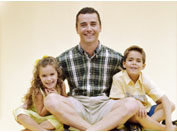| |
Sessions:
Family
Dinner (precedes each session)
|
| Session
1: Orientation and Getting
Started |
Session
9: Chemical Dependency Affects
the Whole Family |
| Session
2: Healthy Living
|
Session 10: Goal Setting |
| Session
3: Nutrition |
Session
11: Making Healthy Choices |
| Session
4: Communication |
Session
12: Healthy Boundaries |
| Session
5: Feelings and Defenses |
Session
13: Healthy Friendships and
Relationships |
| Session
6: Anger Management |
Session
14: How We Learn |
| Session
7: Facts about Alcohol,
Tobacco
and Other Drugs |
Session
15: Our Uniqueness |
|
Session 8: Chemical Dependency is a
Disease |
Session
16: Celebration! |
Note: Sessions for 3 year olds and 4-7 year olds vary in topics
from those addressed with children, pre-adolesecent/adolesenct and
parents. Some topics are considered too mature for the 3-7 year
olds to comprehend.
Session
Structure
Family Dinner
Age Appropriate Groups
Opening
- Centering
- Group Agreements
- Opening Activity
- Review (Acts of Kindness)
Insights for Living
- Teaching Content & Learning Activities
Closing
- Reflection (WOW) & Closing
Connecting with My Family
Each session of Celebrating Families!™ is fully scripted,
including role-plays, handouts, children's stories and activity
sheets. The curriculum incorporates addiction/recovery concepts
with healthy family and living skills. Celebrating Families!™
teaches:
|
Skills
- Anger Management
- Communication
- Expression of Feelings, Understanding defenses
- Boundaries
- Refusal skills
- Choosing safe and trustworthy friends
- Problem Solving: Steps in making decisions, dreams
and goal setting.
- Identification of a safe person.
- Meditation/Centering/Relaxation
|
Information
- Facts about alcohol, tobacco, prescription and
illegal drug use; addiction; brain chemistry.
- Facts about how chemical dependency affects families,
friends and relationships.
- Facts about domestic violence
- Recognition of the influence of media and advertising.
-
Facts about Domestic Violence.
- Learning differences and FASD
- Knowledge that we are part of something larger
than ourselves (Wonder of the World Moments).
|
|
Insights
-
Caring and empathy through acts
of kindness
-
Self-Worth/Self Efficiency: recognizing and celebrating
each person's uniqueness.
-
Helping Others: acts of kindness.
-
WOW - Wonder of the World - learning and appreciating
that we are part of something larger than ourselves.
-
Affirmations: importance of one-on-one time with children,
telling children "I love you".
|
The parent curriculum specifically reinforces
and explains what clients learn in treatment and Twelve step
recovery programs. Its content includes basic concepts such
as the importance of spending one-on-one-time with children
and telling children "I love you".
Top
|


